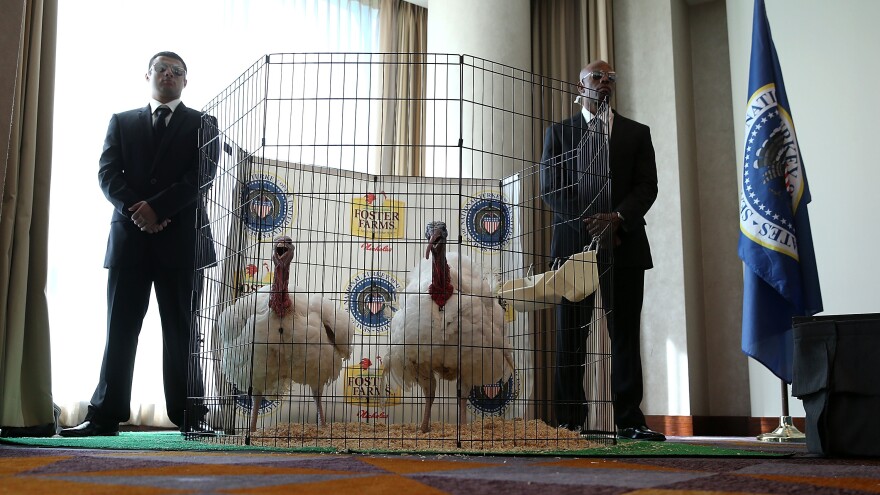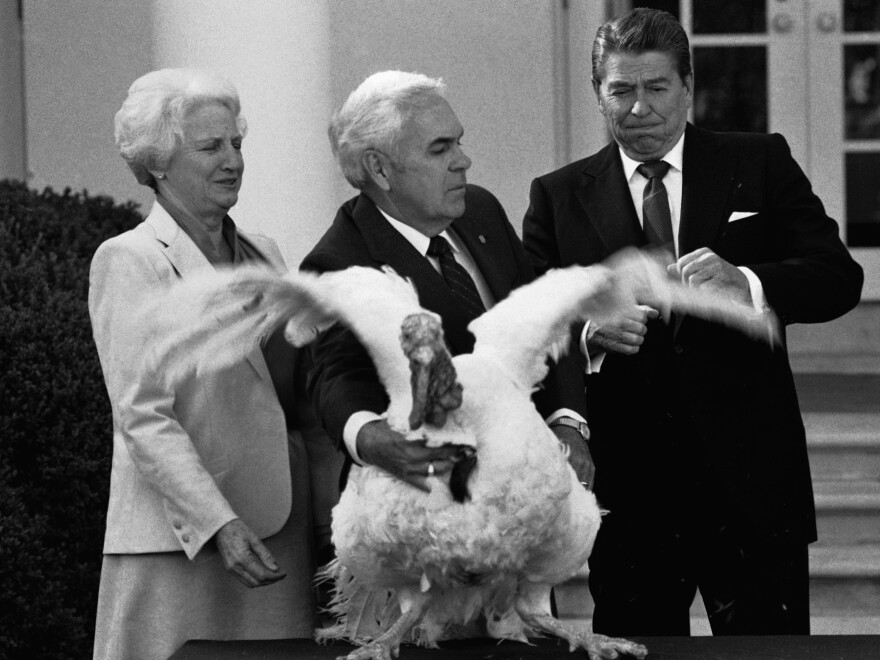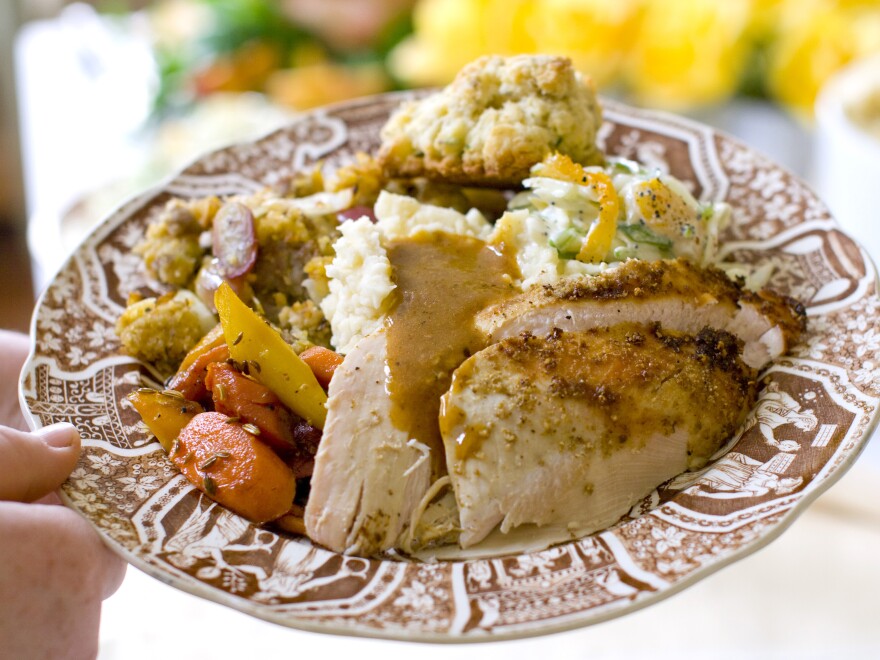Editor's note: This story was originally posted last year. Some information was updated on Nov. 22, 2016.
The annual presidential turkey pardoning event at the White House is a strange one. This year is President Obama's eighth and last one, but he still seems confused.
"It is a little puzzling that I do this every year," Obama said in 2014.
"I know some folks think this tradition is a little silly," he said a year later. "I do not disagree."
The president has made the event something of an annual dad joke.
"Time flies, even if turkeys don't," Obama said last year, flanked by his daughters Sasha and Malia. There was a long pause and eventual polite laughter from his daughters and audience. "You think it's funny, too, don't you?" the president said to the crowd.
Introducing Tater and Tot, the 2016 National #Thanksgiving Turkeys: https://t.co/wTcdWKlWAM #WHTurkeyPardon pic.twitter.com/H3NjsU6YNT
— White House Archived (@ObamaWhiteHouse) November 22, 2016
The turkeys always have punny names. Last year's were "Honest" and "Abe." The year before that "Mac" and "Cheese." This year — "Tater" and "Tot." But despite proclamations of how the birds will live out their golden years in splendor, the joke... might be on the turkeys. They don't live very long after pardoning. (More on that below.)
There's always lots of laughter for a lighthearted moment the day before Thanksgiving, but the truth behind turkey pardons is a strange and sad tale with a long and myth-filled history.
So who are these overstuffed fowl? Where did they come from? And how did this whole thing get started, anyway? We try to answer those questions, and more:
1. Where did they find these turkeys?
This year's birds, "Tater" and "Tot," come from a farm in Storm Lake, Iowa, run by Chris and Nicole Domino. The family has been growing turkeys for nine years and raise about 185,000 a year, according to the Kansas City Star.
Who will receive this year’s #WHTurkeyPardon? Vote before the official ceremony tomorrow: https://t.co/wTcdWKlWAM #TeamTater #TeamTot
— White House Archived (@ObamaWhiteHouse) November 22, 2016
Both birds will be spared, but just one will stand for the official pardoning. That bird is chosen in a White House contest.
These birds were separated from the flock and raised in a white building with red trim and Americana bunting. The turkeys will only be about four-and-a-half months old when they get to the White House.
Each turkey in the Presidential Flock practices standing on the podium to determine which turkey is the best for the job! #turkeypardon2016 pic.twitter.com/F6HyCwY2KO
— Iowa Turkey Fed. (@IowaTurkey) November 14, 2016
The birds, selected from about 20, even went through podium practice to test their temperament.

2. Do they always get the turkeys from the same place?
No. This is an event run by the National Turkey Federation. Yes, even turkeys have lobbyists. (They have offices four blocks from the White House.)
The group is so involved in the event that it even pays for the turkeys to take a presidential-style motorcade from the farm to the airport flanked by fake Secret Service agents.
The men in dark suits with earpieces are all part of the show, as are faux presidential decals depicting a turkey wearing a pilgrim hat at the center of the "Seal of the National Turkey of the United States."
3. When and why did this begin?
This whole thing got started in 1947 when Harry Truman was president. And that has actually been a source of confusion. Bill Clinton in his 1997 pardoning ceremony proclaimed that Truman was the first to pardon a turkey. But that's not true. The Truman Library issued a statement in 2003 saying:
"The Library's staff has found no documents, speeches, newspaper clippings, photographs, or other contemporary records in our holdings which refer to Truman pardoning a turkey that he received as a gift in 1947, or at any other time during his Presidency. ... Truman sometimes indicated to reporters that the turkeys he received were destined for the family dinner table."
So, Truman was the first to receive a ceremonial turkey from the National Turkey Federation (and the Poultry and Egg National Board), but he ate it (as did Eisenhower). And that was the intention of the gift — to raise the profile of the bird and maintain its institutionalization as a Thanksgiving and Christmas staple.
The tradition of giving turkeys to the president goes much further back, though, than industry groups' involvement.
From 1873 to 1913, a turkey dealer from Rhode Island named Horace Vose, known as the "Poultry King," became the unofficial turkey provider to the White House for Thanksgiving and Christmas, according to the White House Historical Society.
In 1913, Vose got some competition from a former Kentucky congressman, who claimed his bird tasted better, because it was fed a diet of red peppers. After Vose died in 1913, it was something of a free for all.
4. OK, so if it wasn't Truman, then who was the first to pardon a turkey?
It depends on your definition of "pardon."
An 1865 dispatch from White House reporter Noah Brooks is the oldest-known account of a presidential turkey clemency. It was about Abraham Lincoln sparing a bird two years earlier. It was a Christmas turkey that his son Tad had taken a liking to.
John F. Kennedy appears to have been the first to pardon a Thanksgiving turkey.

"We'll just let this one grow," he said.
The LA Times headlined that 1963 event as a "presidential pardon," but a sign hung around the turkey's neck that read, "Good eating, Mr. President." The intention, at least from the giver, was clear.
Richard Nixon also chose not to eat one particular bird and sent it to a petting zoo instead.

Ronald Reagan in 1987 was technically the first president to use the word "pardon" about a turkey, but it was really just a way to deflect questions about the Iran-Contra scandal and whether he would pardon key players involved — Oliver North and John Poindexter.
The bird, "Charlie," was already headed for a petting zoo, but after Sam Donaldson of ABC News pressed Reagan on whether he'd pardon North and Poindexter, Reagan responded, "If they'd given me a different answer on Charlie and his future, I would have pardoned him."
The president who formalized the event was George H.W. Bush, giving birth to the modern-day tradition.

5. What happens to the turkey afterward?
This is where the story turns very sad.
This year's turkeys will be sent to Virginia Tech, where, the White House says, "they will be cared for by veterinarians and students of Virginia Tech's Animal and Poultry Sciences Department at 'Gobbler's Rest' in Blacksburg, Virginia."
The turkeys got to meet the Hokie mascot, where the Turkey Federation joked in a tweet that "these new buds will be hanging out together at their new home after" the pardon.
But probably not for long...
The average lifespan of a turkey in the wild is only three to four years, but these birds, because they are bred to be eaten, have lived on average far less than that.
Many industrially grown turkeys are fattened up with a protein-rich diet of corn and soybeans. They can't fly, because they are too big; their bone structures can't hold up all that weight for very long; and their organs fail if they're kept alive too long.
Every pardoned turkey is dead except three, who are only at this point presumed alive... 2014's "Cheese" and 2015's "Honest" and "Abe."
"Cheese," the second half of 2014's duo ("Mac" died in July 2015, just eight months after pardoning) was reportedly still alive, as of November of last year. Morven Park in Virginia, where the birds were sent, touted "presidentially pardoned" turkeys (plural) to visit, perhaps including 2015's "Honest" and "Abe," though these haven't been confirmed by NPR.
The outlier in all this was "Courage," the first bird pardoned by Obama in 2009. In 2015, Courage had been reported dead by other outlets, but Disneyland, where the bird was sent, contacted NPR to let us know the fowl was still kicking.
We reached out this year about "Courage's" status. And, sadly, Disneyland confirmed that "Courage" has died.
"Courage passed earlier this year," Suzi Brown, a Disneyland spokeswoman told NPR.
Living six-plus years might be some kind of record set by Courage. Disneyland has a theory.
"Because he was under our care and fed a balanced diet," Brown told NPR, "he slimmed down quite a bit and lived quite a healthy life here at the resort."
The unfortunate reality for these turkeys has been a sore point for animal-rights activists, like People for the Ethical Treatment of Animals, better known as PETA, which listed its complaints, including noting the fates of the recent "pardoned" birds.
Others, including writers at the Washington Post and Vox, have called the pardon "America's dumbest" and "most absurd holiday tradition."
The turkey federation, of course, pushes back on the notion that the event is an arcane one that has seen it's time come and go.
"Think of the meaning of Thanksgiving," Keith Williams, vice president for communications and marketing at the turkey federation, argued to NPR in 2015. "It's always been about the presentation of the National Thanksgiving Turkey — symbolic of the blessings of agriculture we have in this country. It becomes a time for the president to recall with the nation our blessings and celebrate the beginning of the holiday season."
6. Why do presidents pardon turkeys? Don't they eat turkey at Thanksgiving?
That irony may account for Obama's puzzlement. He also joked in 2014 that he was saving those turkeys from a "terrible and delicious fate."
People are full of contradictions.
It's clearly been difficult for politicians to say on camera that they would eat the bird presented to them, especially as America has grown away from an agricultural society and grown up with Disney movies heavy on the personification of animals. Americans are far more removed from the actual process of how their food makes its way to their table.
"Your grandmother (1940s) would have killed her own and prepared it," Keith Williams of the turkey foundation noted. "Since the 1950s, it became more convenient for families to have the dressed turkeys (all ready to cook), which they bought from the butcher or their grocery store. Few people actually hunt and dress their own food — we thankfully have the farmers who grow and deliver food to us."
Side fact: The turkey federation actually provides dressed turkeys to presidents, too. Obama has donated his.
The turkey federation seems potentially open to a return to the days when presidents ate the turkeys presented to them.
"The pardoning was a recent custom begun with President George H.W. Bush," Williams noted.
Some traditions are hard to change.
It's something to think about after you walk through the grocery store, pick out that turkey — and sit down at the Thanksgiving dinner table.
Copyright 2023 NPR. To see more, visit https://www.npr.org.



